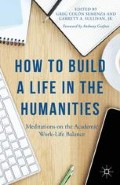Abstract
Academic guilt plagues me whenever I am not working. In this profession, after all, there is always something to do: new publications to read, a book, article, proposal, conference paper, or even an annual update to write, grading, lesson plans, and course development—and that’s only in between teaching, office hours, faculty meetings, and other on-campus obligations. The seemingly endless demands on my time blur the line between my professional and private lives. To say I take work home would be an understatement. Almost every room in my house bears the mark of my professional life, whether in the form of stacks of student essays on the dining room table, read and unread issues of PMLA on the television stand, or the pile of interlibrary loans in the foyer. Books I’m reading for fun (but really for a new course I’m teaching next semester) sit on my nightstand. These ever-present reminders of work undone fuel my academic guilt, acting as specters of my professional life even in the most private of settings.
Access this chapter
Tax calculation will be finalised at checkout
Purchases are for personal use only
Preview
Unable to display preview. Download preview PDF.
Notes
Kim, S., R. S. Jorgensen, and R. Thibodeau. “Shame, Guilt, and Depressive Symptoms: A Meta-Analytic Review,” Psychological Bulletin 137 (2011): 68–96, 69.
Kim, Jorgensen, and Thibodeau, “Shame,” 71. See also de Hooge, I. E., R. M. A. Nelissen, S. M. Breugelmans, and M. Zeelenberg. “What is Moral About Guilt? Acting ‘Prosocially’ at the Disadvantage of Others,” Journal of Personality and Social Psychology 100 (2011): 462–473, 462.
Blum, A. “Shame and Guilt, Misconceptions and Controversies: A Critical Review of the Literature,” Traumatology 14 (2008): 91–102, 92, 100
Katchadourian, H. Guilt: The Bite of Conscience, Stanford: Stanford University Press, 2010. 23.
Barreca, G. “Bribes and Guilt as Tools for Writings.” The Chronicle of Higher Education, May 23, 2011, accessed August 6, 2014, http://chronicle.com/blogs/brainstorm/bribes-and-guilt-as-tools-for-writing/35605.
Frank, A. “Some Affective Bases for Guilt: Tomkins, Freud, Object Relations,” English Studies in Canada, 32 (2006): 11–25, 11.
Kale, V. “Family Saturday: Six Unexpected Benefits,” Richmond Family Magazine Online, November 2013, accessed June 4, 2014, http://richmondfamilymagazine.com/article/family-saturday/.
Editor information
Copyright information
© 2015 Greg Colón Semenza and Garrett A. Sullivan, Jr.
About this chapter
Cite this chapter
Lobo, G.I. (2015). Academic Guilt. In: Semenza, G.C., Sullivan, G.A. (eds) How to Build a Life in the Humanities. Palgrave Macmillan, New York. https://doi.org/10.1057/9781137428899_10
Download citation
DOI: https://doi.org/10.1057/9781137428899_10
Publisher Name: Palgrave Macmillan, New York
Print ISBN: 978-1-137-42888-2
Online ISBN: 978-1-137-42889-9
eBook Packages: Palgrave Literature CollectionLiterature, Cultural and Media Studies (R0)

